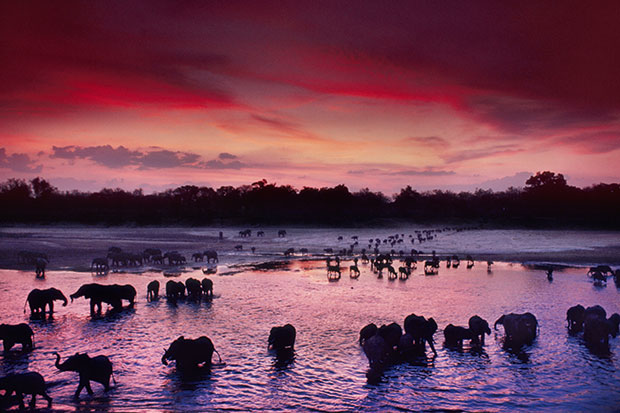Simon Barnes opens with a presumably true idea, that we are all in search of our own versions of paradise — a special place presented here as the sacred ‘combe’ of the title, being a word with Celtic origins that describes a steep hollow or hidden valley. These paradises might be real or imagined, exist only in memory, or live in fiction like Narnia or Robin Hood’s forest; they can be unattainable, beyond reach, or ruined, like Eden. His point, frequently stated, is that we are always on a quest for them, and need them.
The particular combe of this book is not on the edge of Dartmoor but in the national parklands of Zambia’s Luangwa river valley. Barnes fell for Luangwa after waking up one day to discover a herd of elephants snacking on the thatched roof of his safari hut. He has been returning there for years, staying at tourist safari camps so often that he has ended up guiding guests and manning the spotlight on night game-drives.
Most of the book is about the Luangwa; its seasons, its birds and plentiful larger animals. He elevates these descriptions to a paean to paradise with many references to childhood, books (Gerald Durrell, Tolkien, C.S. Lewis), painting and even the movie Withnail & I. At its core, Barnes’s argument is that people are driven by what he calls biophilia — the need for contact with non-human life — ‘to be revived when we smell a rose or pat a dog or see a passing skein of geese from the window of the train that takes us to work’.
While visiting the Luangwa, Barnes didn’t need to earn his keep as a safari wallah. A former top sports writer for the Times and the author of many books on birdwatching, horses and cricket — an output that amounts to logorrhoea — he is presumably full of what Zambians call ‘cash money’.
He does it, you sense, because he loves telling everybody about how wonderful everything is in Luangwa — and wher-ever he goes in the world. Given the state of this natural world — melting polar caps, elephant-poaching, multiple extinctions, loss of habitat and rampant urbanisation — you would expect him to be at least occasionally gloomy. Not a bit of it. He is relentlessly positive, upbeat and happy. While reading this book I became grimly determined to find something that depressed or alarmed Barnes, and I failed.
‘Good morning, Simon. Your water is ready.’ The softest and gentlest voice in Africa woke me. ‘Thanks Denis.’
This works if you want to go on safari to the Luangwa, and Barnes is organising one off the back of The Sacred Combe’s publication: only £5,995 for 12 days. He is probably a super travelling companion and clearly he’s good on his birds and now knows a great deal about Africa’s animals. I’m a little worried about his confession that he is unable to drive a car — but presumably Denis or somebody else does that in the bush.
But I’m not sure that Barnes’s bumptious optimism works in this book. First of all, this doesn’t seem to be the same Africa that the rest of us live in. He says over the years he’s seen Mfuwe township near the park boundaries grow from
a couple of dusty old shops, to a thriving place full of beauty parlours, bars, a first-class school, all kinds of good things. Inevitably this brings problems…
He notes that these include ‘some’ wildlife poaching and a ‘higher demand for firewood. But these are infinitely better problems that those that come with abandonment and neglect.’ I do not wish to spoil the mood here, but Africa is being ravaged by deforestation, as an exploding population chops trees down to cook food, much of which arrives as aid donations from overseas. For wildlife, the loss of habitat is the biggest problem, but poaching is the next devastation. Rhinos and elephants make the news, but the real losses are among all the other plains game species that hungry humans want to eat. Luangwa is not under the threat of destruction in the way that Kenya’s Masai Mara is (human encroachment and development may kill that very soon), but it’s just a matter of time.
Worse than the way Barnes’s optimism disregards the context of abject peril, though, is his need to provide lists: famous elephants, animal books, killer animals and one called ‘Some Turds’. In this age of social media, writing lists in a narrative is surely to be regarded as an egregious offence. But the tendency to include them throws up a more serious fault, which is that The Sacred Combe is less an investigation into why or how we need our own versions of paradise than an inventory of famous ones we already know about.
The other problem — and there are no ‘better problems’ — is sometimes his style. He writes about ‘the realest, deepest and most important truth of this book…’ and feels bold enough to include this sentence: ‘Each ebony glade is a sacred combe within a sacred combe: a deeper and more powerful level of sacredness.’ Why did his editors allow him to do this? Why?







Comments